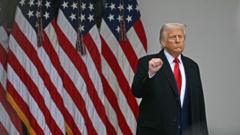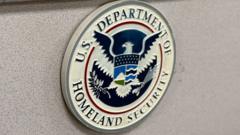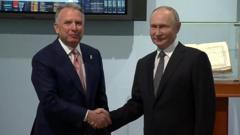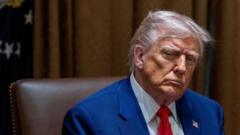As President Trump's tariffs set off market chaos and provoke bipartisan dissent, his ambitious agenda faces critical tests at home and abroad.
**Trump's Bold Tariff Moves Clash with Harsh Political Realities**

**Trump's Bold Tariff Moves Clash with Harsh Political Realities**
Trump's new tariffs stir economic turmoil and political pushback as challenges loom ahead.
In a flash of boldness, Donald Trump declared April 2 as America's "liberation day" while announcing significant new tariffs on U.S. imports. However, the reality he confronted was far from the historical triumph he envisioned. Following his announcement, U.S. stock markets spiraled downward, and tensions rose with trading partners like Canada, the EU, and China, who appear ready to retaliate.
During a tumultuous week, the White House was eerily quiet, with few officials available to address mounting media scrutiny. Security preparations were evident across Washington, as workers set up fencing around the White House, expecting large-scale protests to coincide with delays in a planned garden event led by the First Lady. Trump, when pressed by reporters amid his travels, remained optimistic, asserting that the economic fallout would soon give way to prosperity.
Responses to his tariffs from the public have been varied, as reactions have warranted both concern and support. With the stock market experiencing its worst week since the pandemic-induced crash, the implications of Trump's economic policies began to reverberate beyond conventional circles. His foreign policy ambitions also faced turbulence, notably as military escalations in Gaza and ongoing strife in Ukraine reveal the complexities of conflict resolution that differ from his initial expectations.
Trump remains firm in his belief that he can reshape American manufacturing, historically aligned with a stance of protectionism. This risks igniting a prolonged trade war, with Republican Senator Ted Cruz expressing fears of potential job losses if reciprocal tariffs trigger further actions from nations like China.
In the realm of immigration, Trump's deportation initiatives encounter judicial challenges, with ongoing legal battles poised to shape enforcement actions. The legal landscape may complicate the administration's aims, especially as the courts weigh in on contentious issues including the status of asylum seekers and birthright citizenship.
Political dynamics shifted this week in crucial elections across the U.S., with notable results suggesting a Democratic resurgence in battlegrounds like Wisconsin. The Democratic candidate's victory in the state race signals a possible swing in voter sentiments, particularly against significant spending by conservative groups and influences such as Elon Musk.
As various factions within his party begin to voice dissent regarding the tariffs, scenarios are developing where Republican lawmakers may reconsider their unwavering allegiance. Limited support for Trump's quixotic tariff visions marks a new turning point, showcasing cracks in a party that has long rallied around his leadership. If economic strife continues or public services are disrupted, Trump may be forced to confront political realities that could significantly alter his administration's trajectory.
Ultimately, while Trump may feel liberated from pre-election constraints, the stern realities of economic instability and political dissent will loom larger in shaping the future of his ambitious agenda.
During a tumultuous week, the White House was eerily quiet, with few officials available to address mounting media scrutiny. Security preparations were evident across Washington, as workers set up fencing around the White House, expecting large-scale protests to coincide with delays in a planned garden event led by the First Lady. Trump, when pressed by reporters amid his travels, remained optimistic, asserting that the economic fallout would soon give way to prosperity.
Responses to his tariffs from the public have been varied, as reactions have warranted both concern and support. With the stock market experiencing its worst week since the pandemic-induced crash, the implications of Trump's economic policies began to reverberate beyond conventional circles. His foreign policy ambitions also faced turbulence, notably as military escalations in Gaza and ongoing strife in Ukraine reveal the complexities of conflict resolution that differ from his initial expectations.
Trump remains firm in his belief that he can reshape American manufacturing, historically aligned with a stance of protectionism. This risks igniting a prolonged trade war, with Republican Senator Ted Cruz expressing fears of potential job losses if reciprocal tariffs trigger further actions from nations like China.
In the realm of immigration, Trump's deportation initiatives encounter judicial challenges, with ongoing legal battles poised to shape enforcement actions. The legal landscape may complicate the administration's aims, especially as the courts weigh in on contentious issues including the status of asylum seekers and birthright citizenship.
Political dynamics shifted this week in crucial elections across the U.S., with notable results suggesting a Democratic resurgence in battlegrounds like Wisconsin. The Democratic candidate's victory in the state race signals a possible swing in voter sentiments, particularly against significant spending by conservative groups and influences such as Elon Musk.
As various factions within his party begin to voice dissent regarding the tariffs, scenarios are developing where Republican lawmakers may reconsider their unwavering allegiance. Limited support for Trump's quixotic tariff visions marks a new turning point, showcasing cracks in a party that has long rallied around his leadership. If economic strife continues or public services are disrupted, Trump may be forced to confront political realities that could significantly alter his administration's trajectory.
Ultimately, while Trump may feel liberated from pre-election constraints, the stern realities of economic instability and political dissent will loom larger in shaping the future of his ambitious agenda.























